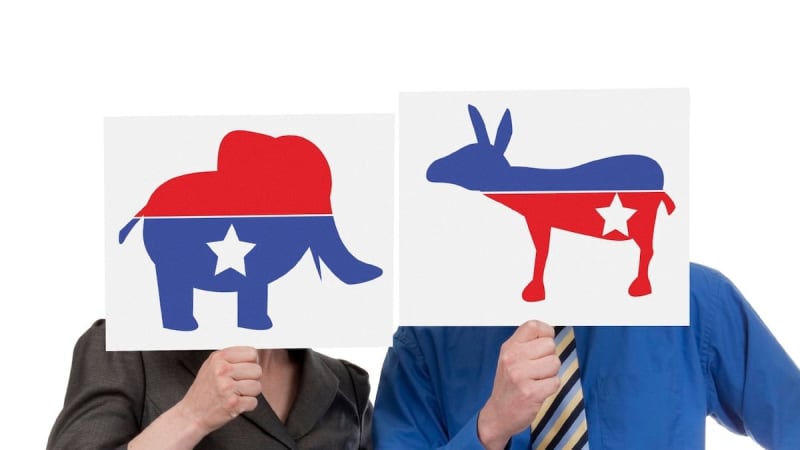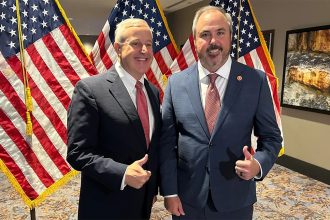Gov. Ron DeSantis made a surprisingly candid admission last weekend.
He revealed that he tried to get Andrew Bain, the judge DeSantis temporarily tapped to replace ousted State Attorney Monique Worrell, to try to keep the job by running for the position as a Democrat — even though Bain wasn’t actually a member of that party.
In doing so, DeSantis made it clear that, regardless of what ideological values or beliefs Bain actually held, DeSantis wanted Bain to tell voters in dark-blue Orange County that he was a Democrat, so they might elect him.
“The problem in Orange County, it’s a very blue area,” DeSantis told attendees at a Police Benevolent Association gathering in Orlando. “And I told him … I was like: You need to be a Democrat. He’s like: ‘I ain’t a Democrat.’ Well, the problem is, it’s a blue area, right? And so you really got to win the Democrat primary.”
Bain, who originally filed campaign papers that said he was running as a Republican, ultimately ran as a no-party-affiliated candidate and lost the election.
But plenty of other politicians in Florida switch parties for precisely the reason DeSantis explained — simply because they want to win. They don’t care about ideology. They’re just counting on support from partisan voters who don’t do anything other than look for the R’s and D’s on the ballot.
That’s one of many reasons I’ve long supported an idea that makes many people uncomfortable — making more races nonpartisan or removing party affiliation from the ballots.
Call me naive, but I’d love to see a political process where voters actually have to do their own research to see who a candidate is, rather than simply voting for a candidate because she or he claims to be a member of the same political club.
Admittedly, many people hate this idea. They like the security blanket of easy labels. The idea also infuriates party leaders and insiders on both sides whose entire existence or paycheck is tied to a divided political system.
Yet, at the same time, I don’t think the average American looks at the current state of politics in this country — with a partisan, divided government facing another shutdown — and concludes: Boy, this is healthy and effective.
Think about the elected offices you’ve watched through the years. Which do you think were more effective? Our bitterly divided Congress or your local, nonpartisan school board? The party-line voters in the Legislature or the local reps on your local commission?
I genuinely understand the argument from people who say party labels help them understand a candidate’s core beliefs. But as DeSantis’ vignette from the past weekend shows, labels don’t really guarantee that. Sometimes they just tell you what a candidate thinks you want to hear.
Also, many politicians use partisanship to shield themselves from accountability. They count on partisan voters defending all kinds of indefensible behavior simply because the ne’er-do-wells share their political affiliation.
DeSantis frequently uses this to his advantage. Think about it: Nobody in their right mind thinks it’s a good idea for politicians to hand out no-bid, taxpayer-funded contracts to their buddies. Yet the DeSantis administration has done so over and over again, counting on people who claim to be fiscal conservatives not even batting an eye because the guys dishing out the graft share their party affiliation.
Party-switching, of course, doesn’t always work. Just ask Charlie Crist.
The former governor used to embrace the name “Chain-gang Charlie” and tried to be John McCain’s running mate when he thought it’d help him ascend the GOP ranks, but later ran for office as an independent and then a Democrat when he thought those labels better suited his aspirations.
I actually understand why some people liked Crist as both a Republican and a Democrat. As one of his supporters once told me: “He’s never mean. He’s just a nice guy.” But I also think Crist has the ideological compass of a weather vane — a guy who viewed party labels as simply a potential means to an electoral end.
Yet as ideologically flexible as Crist seemed, I was also fascinated by the Democrats who loathed Crist as a Republican but then became enamored with him when he joined their party. He was, after all, the same guy.
There’s another candidate for governor now running as a Republican-turned-Democrat, David Jolly.
Jolly actually displayed some courageous independence during his brief tenure as a GOP congressman, essentially blowing the whistle on both parties’ unseemly fundraising operation on “60 Minutes.” But man, I’d like for everybody to vote in his election — and all elections — because of what a candidate has done, rather than for the party affiliation they claim to represent.
A few states have taken steps to remove party labels. Nebraska elects its Legislature in nonpartisan races. And Washington took a small step away from party labels by partially banning them on the ballots. But it was truly just a small step, because Washington still allows candidates to put the phrases “Prefers Republican Party” and “Prefers Democratic Party” in parentheses after their names.
I get that people like easy labels. But I’m struck by how many people tell me they’re sick of politics getting increasingly partisan, ugly and ineffective while also clinging to the very system that’s making it that way.
©2025 Orlando Sentinel









